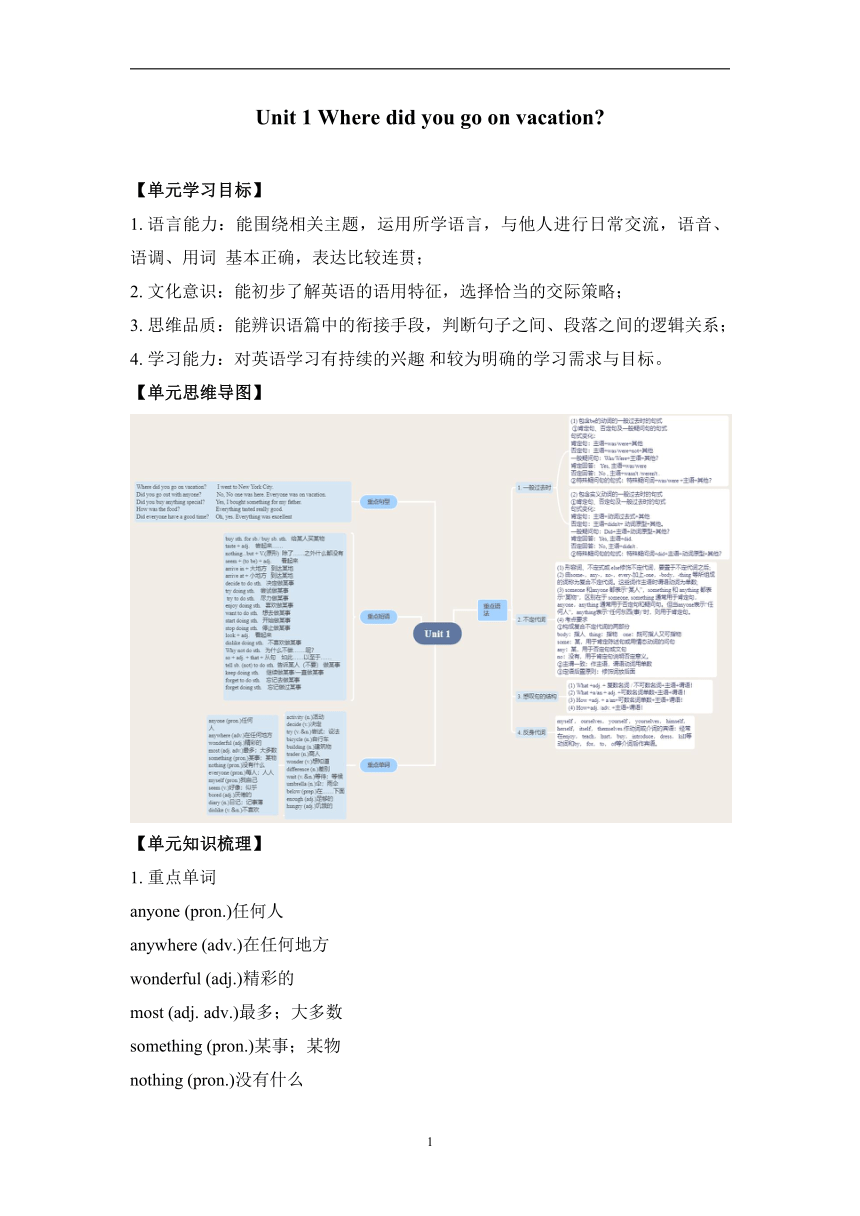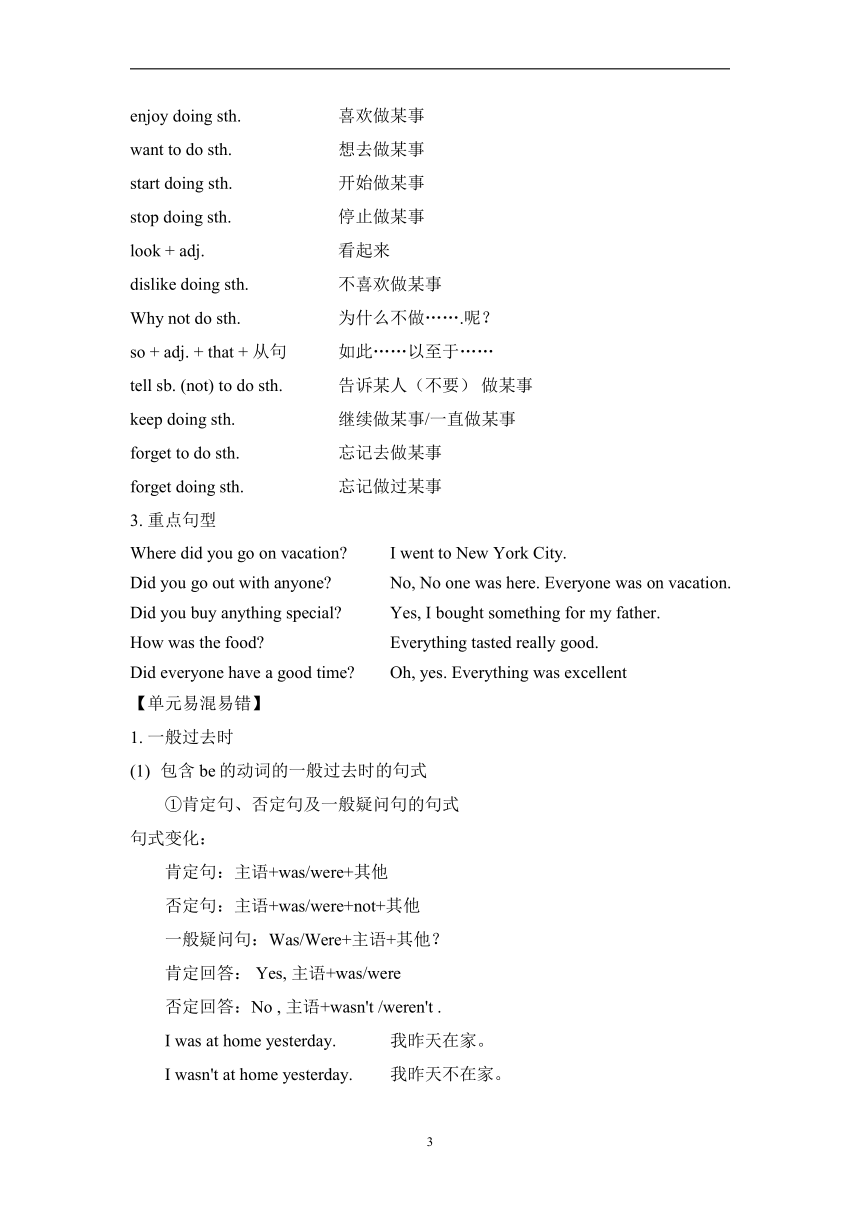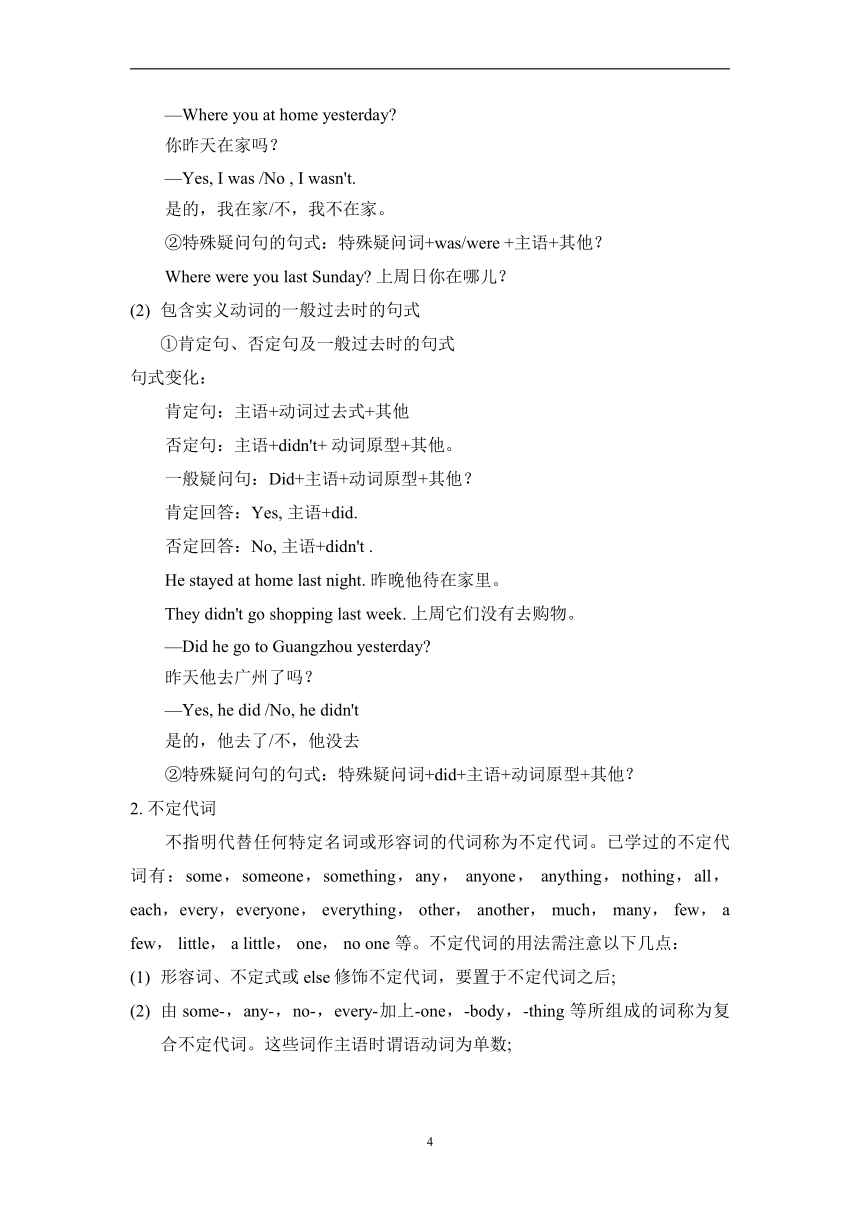Unit 1 Where did you go on vacation 人教版英语八年级上册单元知识汇总
文档属性
| 名称 | Unit 1 Where did you go on vacation 人教版英语八年级上册单元知识汇总 |  | |
| 格式 | docx | ||
| 文件大小 | 186.9KB | ||
| 资源类型 | 教案 | ||
| 版本资源 | 人教新目标(Go for it)版 | ||
| 科目 | 英语 | ||
| 更新时间 | 2023-10-24 20:26:38 | ||
图片预览




文档简介
Unit 1 Where did you go on vacation
【单元学习目标】
语言能力:能围绕相关主题,运用所学语言,与他人进行日常交流,语音、语调、用词 基本正确,表达比较连贯;
文化意识:能初步了解英语的语用特征,选择恰当的交际策略;
思维品质:能辨识语篇中的衔接手段,判断句子之间、段落之间的逻辑关系;
学习能力:对英语学习有持续的兴趣 和较为明确的学习需求与目标。
【单元思维导图】
【单元知识梳理】
1. 重点单词
anyone (pron.)任何人
anywhere (adv.)在任何地方
wonderful (adj.)精彩的
most (adj. adv.)最多;大多数
something (pron.)某事;某物
nothing (pron.)没有什么
everyone (pron.)每人;人人
myself (pron.)我自己
hen (adj.)母鸡 10.pig (n.)猪
seem (v.)好像;似乎
bored (adj.)厌倦的
diary (n.)日记;记事薄
activity (n.)活动
decide (v.)决定
try (v.&n.)尝试;设法
bicycle (n.)自行车
building (n.)建筑物
trader (n.)商人
wonder (v.)想知道
difference (n.)差别
wait (v.&n.)等待;等候
umbrella (n.)伞;雨伞
below (prep.)在……下面
enough (adj.)足够的
hungry (adj.)饥饿的
dislike (v.&n.)不喜欢
2. 重点短语
buy sth. for sb./ buy sb. sth. 给某人买某物
taste + adj. 尝起来……
nothing...but + V.(原形) 除了……之外什么都没有
seem + (to be) + adj. 看起来
arrive in + 大地方 到达某地
arrive at + 小地方 到达某地
decide to do sth. 决定做某事
try doing sth. 尝试做某事
try to do sth. 尽力做某事
enjoy doing sth. 喜欢做某事
want to do sth. 想去做某事
start doing sth. 开始做某事
stop doing sth. 停止做某事
look + adj. 看起来
dislike doing sth. 不喜欢做某事
Why not do sth. 为什么不做…….呢?
so + adj. + that + 从句 如此……以至于……
tell sb. (not) to do sth. 告诉某人(不要) 做某事
keep doing sth. 继续做某事/一直做某事
forget to do sth. 忘记去做某事
forget doing sth. 忘记做过某事
3. 重点句型
Where did you go on vacation I went to New York City.
Did you go out with anyone No, No one was here. Everyone was on vacation.
Did you buy anything special Yes, I bought something for my father.
How was the food Everything tasted really good.
Did everyone have a good time Oh, yes. Everything was excellent
【单元易混易错】
一般过去时
包含be的动词的一般过去时的句式
①肯定句、否定句及一般疑问句的句式
句式变化:
肯定句:主语+was/were+其他
否定句:主语+was/were+not+其他
一般疑问句:Was/Were+主语+其他?
肯定回答: Yes, 主语+was/were
否定回答:No , 主语+wasn't /weren't .
I was at home yesterday. 我昨天在家。
I wasn't at home yesterday. 我昨天不在家。
—Where you at home yesterday
你昨天在家吗?
—Yes, I was /No , I wasn't.
是的,我在家/不,我不在家。
②特殊疑问句的句式:特殊疑问词+was/were +主语+其他?
Where were you last Sunday 上周日你在哪儿?
包含实义动词的一般过去时的句式
①肯定句、否定句及一般过去时的句式
句式变化:
肯定句:主语+动词过去式+其他
否定句:主语+didn't+ 动词原型+其他。
一般疑问句:Did+主语+动词原型+其他?
肯定回答:Yes, 主语+did.
否定回答:No, 主语+didn't .
He stayed at home last night. 昨晚他待在家里。
They didn't go shopping last week. 上周它们没有去购物。
—Did he go to Guangzhou yesterday
昨天他去广州了吗?
—Yes, he did /No, he didn't
是的,他去了/不,他没去
②特殊疑问句的句式:特殊疑问词+did+主语+动词原型+其他?
不定代词
不指明代替任何特定名词或形容词的代词称为不定代词。已学过的不定代词有:some,someone,something,any, anyone, anything,nothing,all,each,every,everyone, everything, other, another, much, many, few, a few, little, a little, one, no one 等。不定代词的用法需注意以下几点:
形容词、不定式或 else修饰不定代词,要置于不定代词之后;
由some-,any-,no-,every-加上-one,-body,-thing 等所组成的词称为复合不定代词。这些词作主语时谓语动词为单数;
someone 和anyone 都表示“某人”,something 和 anything 都表示“某物”,区别在于 someone, something 通常用于肯定句,anyone,anything 通常用于否定句和疑问句。但当anyone表示“任何人”,anything表示“任何东西(事)”时,则用于肯定句。
考点要求
①构成复合不定代词的两部分
body:指人 thing:指物 one:既可指人又可指物
some:某,用于肯定陈述句或用情态动词的问句
any:某,用于否定句或文句
no:没有,用于肯定句说明否定意义。
②主谓一致:作主语,谓语动词用单数
Everybody in our class is interested in English.
③定语后置原则:修饰词放后面
I have something important to tell you.
到达get to/reach/arrive
get to+地点=reach+地点= arrive at+地点(小)=arrive in+地点(大)
注意:若他们后面要加地点副词here, there, home等,则不需要加介词。
nothing...but do sth. “除......之外; 只有”,
如:I have nothing to do but watch TV all day long.
feel like “感受到;摸起来”
后跟宾语从句或名词。如:I felt like I was a bird. It feels like a stone.
另外,构成短语 feel like doing sth.意为“想做某事”。如:I feel like eating.
so…that… 如此…以致于(结果)
My legs were so tired that I wanted to stop.
so+形/副+that 从句:She is so popular that everyone likes her.
such+名短+ that 从句:She is such a popular girl that everyone likes her.
感叹句的结构:
What +adj. + 复数名词 / 不可数名词+主语+谓语!
What +a/an + adj. +可数名词单数+主语+谓语!
How +adj. + a/an+可数名词单数+主语+谓语!
How+adj. /adv. +主语+谓语!
反身代词
myself , ourselves, yourself , yourselves, himself, herself, itself, themselves.作动词或介词的宾语:经常在enjoy, teach, hurt, buy, introduce, dress, kill等动词和by, for, to, of等介词后作宾语。
He is teaching himself English. 他在自学英语。
She was talking to herself. 她自言自语。
He lives by himself in the country. 他独自住在乡下。
by oneself 独自 enjoy oneself 玩的愉快
too many “太多”其后接可数名词复数
He always has too many questions to ask me.
too many + 可数名词复数 意为“太多... ”
too much + 不可数名词 意为“太多... ”
much too + 形容词 意为“太... ”
【单元对接中考】
【23年河南】A: What a pity! When did you go there
B: ③__________. I went with my family.
【23年河北】—Where did you get the toy car
—From Betty. She made it ___________.
A. myself B. himself C. herself D. yourself
【23年河北】fine,what,weather
________________________________________________!
【23年广东】According to some research, before toothbrushes appeared, the ancient Chinese people ③_______ (clean) their teeth with some small tree branches (树枝).
【22年重庆】_________ a fresh spring morning it is!
A. Who B. Why C. What D. How
【22年吉林】—Helen, why didn't you come to the party yesterday
—Oh, I ______ for the speech competition.
A. prepares B. prepared C. will prepare
【22 年吉林】—Kate, do you know______
—In the school hall.
A. when we'll have the English party
B. why we'll have the English party
C. where we'll have the English party
【21 年福建】"In the old host-to-be performance, the final thing you were 4 (required) to do was to jump on a trampoline(蹦床) while interviewing 5 ," she told the reporter, "I didn't have a trampoline and I didn't want to do it in front of anyone else, so I interviewed myself while jumping on my bed, having the recording made."
5. A. everybody B. somebody C. nobody
答案以及解析
1.答案:Last Saturday
解析:根据When did you go there (你什么时候去那里的?) 可知此处是回答时间的。故填Last Saturday。
2.答案:C
解析:本题考查反身代词。—你从哪里得到的这个玩具汽车?—从贝蒂那里。她自己做的。此处主语是She,故反身代词应用herself。
3.答案:What fine weather!
解析:根据所给的词和标点,可知本题为感叹句。what是感叹词,fine是形容词,weather是不可数名词,句型结构为:What+形容词+不可数名词(+主语+谓语动词)!故答案为:What fine weather。
4.答案:cleaned
本题考查动词的时态。此处是说,古代中国人用一些小树枝刷牙。clean one's teeth表示"刷牙"。根据设空前的"before toothbrushes appeared"和"the ancient Chinese people"可知,此处应用clean的过去式cleaned。
5.答案:C
解析:本题考查感叹句的结构。感叹名词morning要用What。
6.答案:B
解析:本题考查动词的时态。根据问句中的"why didn't you"可知, 答语应用一般过去时, 故选B
7.答案:C
解析:本题考查宾语从句的用法。根据答语"In the school hall"可知,宾语从句的关联词应用where, 故答案为C。
8.答案:B
解析:根据下文中的"I didn't want to do it in front of anyone else, so I interviewed myself"可知此处是说,采访某个人,故选B,somebody表示"某人"。everybody每人;nobody没有人。
2
【单元学习目标】
语言能力:能围绕相关主题,运用所学语言,与他人进行日常交流,语音、语调、用词 基本正确,表达比较连贯;
文化意识:能初步了解英语的语用特征,选择恰当的交际策略;
思维品质:能辨识语篇中的衔接手段,判断句子之间、段落之间的逻辑关系;
学习能力:对英语学习有持续的兴趣 和较为明确的学习需求与目标。
【单元思维导图】
【单元知识梳理】
1. 重点单词
anyone (pron.)任何人
anywhere (adv.)在任何地方
wonderful (adj.)精彩的
most (adj. adv.)最多;大多数
something (pron.)某事;某物
nothing (pron.)没有什么
everyone (pron.)每人;人人
myself (pron.)我自己
hen (adj.)母鸡 10.pig (n.)猪
seem (v.)好像;似乎
bored (adj.)厌倦的
diary (n.)日记;记事薄
activity (n.)活动
decide (v.)决定
try (v.&n.)尝试;设法
bicycle (n.)自行车
building (n.)建筑物
trader (n.)商人
wonder (v.)想知道
difference (n.)差别
wait (v.&n.)等待;等候
umbrella (n.)伞;雨伞
below (prep.)在……下面
enough (adj.)足够的
hungry (adj.)饥饿的
dislike (v.&n.)不喜欢
2. 重点短语
buy sth. for sb./ buy sb. sth. 给某人买某物
taste + adj. 尝起来……
nothing...but + V.(原形) 除了……之外什么都没有
seem + (to be) + adj. 看起来
arrive in + 大地方 到达某地
arrive at + 小地方 到达某地
decide to do sth. 决定做某事
try doing sth. 尝试做某事
try to do sth. 尽力做某事
enjoy doing sth. 喜欢做某事
want to do sth. 想去做某事
start doing sth. 开始做某事
stop doing sth. 停止做某事
look + adj. 看起来
dislike doing sth. 不喜欢做某事
Why not do sth. 为什么不做…….呢?
so + adj. + that + 从句 如此……以至于……
tell sb. (not) to do sth. 告诉某人(不要) 做某事
keep doing sth. 继续做某事/一直做某事
forget to do sth. 忘记去做某事
forget doing sth. 忘记做过某事
3. 重点句型
Where did you go on vacation I went to New York City.
Did you go out with anyone No, No one was here. Everyone was on vacation.
Did you buy anything special Yes, I bought something for my father.
How was the food Everything tasted really good.
Did everyone have a good time Oh, yes. Everything was excellent
【单元易混易错】
一般过去时
包含be的动词的一般过去时的句式
①肯定句、否定句及一般疑问句的句式
句式变化:
肯定句:主语+was/were+其他
否定句:主语+was/were+not+其他
一般疑问句:Was/Were+主语+其他?
肯定回答: Yes, 主语+was/were
否定回答:No , 主语+wasn't /weren't .
I was at home yesterday. 我昨天在家。
I wasn't at home yesterday. 我昨天不在家。
—Where you at home yesterday
你昨天在家吗?
—Yes, I was /No , I wasn't.
是的,我在家/不,我不在家。
②特殊疑问句的句式:特殊疑问词+was/were +主语+其他?
Where were you last Sunday 上周日你在哪儿?
包含实义动词的一般过去时的句式
①肯定句、否定句及一般过去时的句式
句式变化:
肯定句:主语+动词过去式+其他
否定句:主语+didn't+ 动词原型+其他。
一般疑问句:Did+主语+动词原型+其他?
肯定回答:Yes, 主语+did.
否定回答:No, 主语+didn't .
He stayed at home last night. 昨晚他待在家里。
They didn't go shopping last week. 上周它们没有去购物。
—Did he go to Guangzhou yesterday
昨天他去广州了吗?
—Yes, he did /No, he didn't
是的,他去了/不,他没去
②特殊疑问句的句式:特殊疑问词+did+主语+动词原型+其他?
不定代词
不指明代替任何特定名词或形容词的代词称为不定代词。已学过的不定代词有:some,someone,something,any, anyone, anything,nothing,all,each,every,everyone, everything, other, another, much, many, few, a few, little, a little, one, no one 等。不定代词的用法需注意以下几点:
形容词、不定式或 else修饰不定代词,要置于不定代词之后;
由some-,any-,no-,every-加上-one,-body,-thing 等所组成的词称为复合不定代词。这些词作主语时谓语动词为单数;
someone 和anyone 都表示“某人”,something 和 anything 都表示“某物”,区别在于 someone, something 通常用于肯定句,anyone,anything 通常用于否定句和疑问句。但当anyone表示“任何人”,anything表示“任何东西(事)”时,则用于肯定句。
考点要求
①构成复合不定代词的两部分
body:指人 thing:指物 one:既可指人又可指物
some:某,用于肯定陈述句或用情态动词的问句
any:某,用于否定句或文句
no:没有,用于肯定句说明否定意义。
②主谓一致:作主语,谓语动词用单数
Everybody in our class is interested in English.
③定语后置原则:修饰词放后面
I have something important to tell you.
到达get to/reach/arrive
get to+地点=reach+地点= arrive at+地点(小)=arrive in+地点(大)
注意:若他们后面要加地点副词here, there, home等,则不需要加介词。
nothing...but do sth. “除......之外; 只有”,
如:I have nothing to do but watch TV all day long.
feel like “感受到;摸起来”
后跟宾语从句或名词。如:I felt like I was a bird. It feels like a stone.
另外,构成短语 feel like doing sth.意为“想做某事”。如:I feel like eating.
so…that… 如此…以致于(结果)
My legs were so tired that I wanted to stop.
so+形/副+that 从句:She is so popular that everyone likes her.
such+名短+ that 从句:She is such a popular girl that everyone likes her.
感叹句的结构:
What +adj. + 复数名词 / 不可数名词+主语+谓语!
What +a/an + adj. +可数名词单数+主语+谓语!
How +adj. + a/an+可数名词单数+主语+谓语!
How+adj. /adv. +主语+谓语!
反身代词
myself , ourselves, yourself , yourselves, himself, herself, itself, themselves.作动词或介词的宾语:经常在enjoy, teach, hurt, buy, introduce, dress, kill等动词和by, for, to, of等介词后作宾语。
He is teaching himself English. 他在自学英语。
She was talking to herself. 她自言自语。
He lives by himself in the country. 他独自住在乡下。
by oneself 独自 enjoy oneself 玩的愉快
too many “太多”其后接可数名词复数
He always has too many questions to ask me.
too many + 可数名词复数 意为“太多... ”
too much + 不可数名词 意为“太多... ”
much too + 形容词 意为“太... ”
【单元对接中考】
【23年河南】A: What a pity! When did you go there
B: ③__________. I went with my family.
【23年河北】—Where did you get the toy car
—From Betty. She made it ___________.
A. myself B. himself C. herself D. yourself
【23年河北】fine,what,weather
________________________________________________!
【23年广东】According to some research, before toothbrushes appeared, the ancient Chinese people ③_______ (clean) their teeth with some small tree branches (树枝).
【22年重庆】_________ a fresh spring morning it is!
A. Who B. Why C. What D. How
【22年吉林】—Helen, why didn't you come to the party yesterday
—Oh, I ______ for the speech competition.
A. prepares B. prepared C. will prepare
【22 年吉林】—Kate, do you know______
—In the school hall.
A. when we'll have the English party
B. why we'll have the English party
C. where we'll have the English party
【21 年福建】"In the old host-to-be performance, the final thing you were 4 (required) to do was to jump on a trampoline(蹦床) while interviewing 5 ," she told the reporter, "I didn't have a trampoline and I didn't want to do it in front of anyone else, so I interviewed myself while jumping on my bed, having the recording made."
5. A. everybody B. somebody C. nobody
答案以及解析
1.答案:Last Saturday
解析:根据When did you go there (你什么时候去那里的?) 可知此处是回答时间的。故填Last Saturday。
2.答案:C
解析:本题考查反身代词。—你从哪里得到的这个玩具汽车?—从贝蒂那里。她自己做的。此处主语是She,故反身代词应用herself。
3.答案:What fine weather!
解析:根据所给的词和标点,可知本题为感叹句。what是感叹词,fine是形容词,weather是不可数名词,句型结构为:What+形容词+不可数名词(+主语+谓语动词)!故答案为:What fine weather。
4.答案:cleaned
本题考查动词的时态。此处是说,古代中国人用一些小树枝刷牙。clean one's teeth表示"刷牙"。根据设空前的"before toothbrushes appeared"和"the ancient Chinese people"可知,此处应用clean的过去式cleaned。
5.答案:C
解析:本题考查感叹句的结构。感叹名词morning要用What。
6.答案:B
解析:本题考查动词的时态。根据问句中的"why didn't you"可知, 答语应用一般过去时, 故选B
7.答案:C
解析:本题考查宾语从句的用法。根据答语"In the school hall"可知,宾语从句的关联词应用where, 故答案为C。
8.答案:B
解析:根据下文中的"I didn't want to do it in front of anyone else, so I interviewed myself"可知此处是说,采访某个人,故选B,somebody表示"某人"。everybody每人;nobody没有人。
2
同课章节目录
- Unit 1 Where did you go on vacation?
- Section A
- Section B
- Unit 2 How often do you exercise?
- Section A
- Section B
- Unit 3 I'm more outgoing than my sister.
- Section A
- Section B
- Unit 4 What's the best movie theater?
- Section A
- Section B
- Unit 5 Do you want to watch a game show?
- Section A
- Section B
- Unit 6 I'm going to study computer science.
- Section A
- Section B
- Unit 7 Will people have robots?
- Section A
- Section B
- Unit 8 How do you make a banana milk shake?
- Section A
- Section B
- Unit 9 Can you come to my party?
- Section A
- Section B
- Unit 10 If you go to the party, you'll have a grea
- Section A
- Section B
